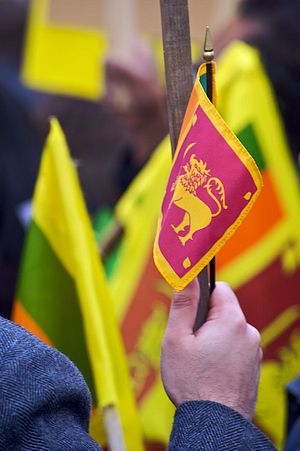The November 16 election will mark the end of Sri Lankan President Maithripala Sirisena’s tenure as the island nation’s elected leader. Expected to take his place is member of the opposition and former Defense Secretary Gotabaya Rajapaksa. It is widely understood that Sirisena is not re-running for the presidency because of his failure to thwart the deadly 2019 Easter terrorist attacks that left 259 dead and over 500 injured around the country. As a result, national security is at the forefront of this year’s elections. Unsurprisingly, Rajapaksa has been quick to capitalize on his military experience during Sri Lanka’s long civil war, projecting himself as a strongman that can protect his recovering nation.
Rajapaksa’s most prominent rival, governing party contender Sajith Premadasa, has likewise placed tackling “religious extremism” at the forefront of his campaign. While terrorism is a high priority moving into the election, the new leadership will have to also balance Sri Lanka’s diplomatic standing in a region being pulled at by global powers.
The country is situated at a geostrategic crossroads in close proximity to one of the world’s busiest shipping lanes. Consequently, Sri Lanka has found itself in the middle of a competition between Indian and Chinese influence. Officials in Beijing eager to expand China’s growing economic and political gravitas have vied to take on as many major infrastructure projects in the region as possible. This has made the government in New Delhi nervous. If Chinese influence grows to the extent that they have access to military ports and airbases in Sri Lanka, India’s southern flank will be exposed to Beijing’s military. The United States, which has been engaged in a trade war with China, is also wary of Chinese expansion and entrenchment in South Asia. In 2018, U.S. Vice President Mike Pence voiced his concerns that the Chinese navy would be permitted to dock at Sri Lankan ports.
Since gaining independence from the British Empire, Sri Lanka has mostly maintained a foreign policy of nonalignment, and in order to safeguard independence and national sovereignty, the future government would be wise to maintain this policy. According to Rajapaksa’s recently published manifesto, he intends to pursue a “friendly nonaligned foreign policy” – signaling an intention to maintain the status quo and build bridges with regional powers.
However, both candidates face national sovereignty challenges given Sri Lanka’s exposure to what skeptics call Chinese “debt-trap” diplomacy – a strategy deployed by Beijing to fund foreign infrastructure projects only to take control of them when loans are not repaid. Most recently, Sri Lanka was effectively forced to cede control of the Hambantota port following a failure to meet its financial obligations to China.
In order to prevent erosion of Sri Lanka’s sovereignty, and by extension national security, the new president will have to carefully balance their relationship with the major powers. Sri Lanka would do well to court the Chinese, Indians, and Americans, neither showing overt favoritism nor causing alienation. With China and India in particular vying for regional influence, Sri Lanka could potentially capitalize on the competition and create favorable diplomatic and commercial agreements. Get it wrong, however, and Sri Lanka may fall too far under the influence of powerful actor.
Dealing with the terrorist threat presents an opportunity for Sri Lanka to engage positively with foreign powers on pressing security issues. Gotabaya Rajapaksa has stated that if he is elected, his goal is “to ensure that [Sri Lanka] which is once again under threat from terrorist and extremist elements is safe and protected.” Rajapaksa and his political opponents recognize that the failure to prevent the Easter bombings was primarily a failure of intelligence. Therefore, the new government’s major task will be restructuring and strengthening the intelligence services as well as leveraging foreign intelligence sharing.
The current government, despite their earlier failings, has already taken a step in the right direction by requesting from India: “intelligence cooperation, bomb disposal assistance, cyber warfare assistance and assistance of training and equipment.” As the closest regional power with a vested interest in counterterrorism, intelligence sharing and cooperation with India makes sense. In addition, the next Sri Lankan government is likely to seek security cooperation with the United States and China. The U.S. remains the world’s foremost military power and Sri Lankan intelligence services and special forces could benefit immensely from cross-training with their American counterparts. This might have the additional benefit of smoothing relations with Washington, where U.S. policymakers are becoming increasingly frustrated by growing Chinese influence in Sri Lanka.
That doesn’t mean Sri Lanka is precluded from Chinese security assistance, however. Beijing can still remain an important partner in fighting regional extremism. Cooperation should not extend to the presence of foreign troops on Sri Lankan soil, except for a handful of visiting advisers. In any case, no serious political contender has entertained such a move.
Whoever comes into power in Sri Lanka will have the difficult task of improving the country’s fragile security profile if they ever hope to deliver sustained economic growth. More importantly, Sri Lanka’s long-term prospects will depend on the ability of its leaders to succeed in the difficult balancing act the island nation finds itself playing between the major powers. Because of its geostrategic standing, a prosperous and secure Sri Lanka is good for regional peace and security.
Mohammed Shihab runs a consultancy practice for Middle Eastern funds and business people seeking to invest in Indonesia and the broader Southeast Asian region. He was formerly at the Indonesian Ministry of Foreign Affairs.

































